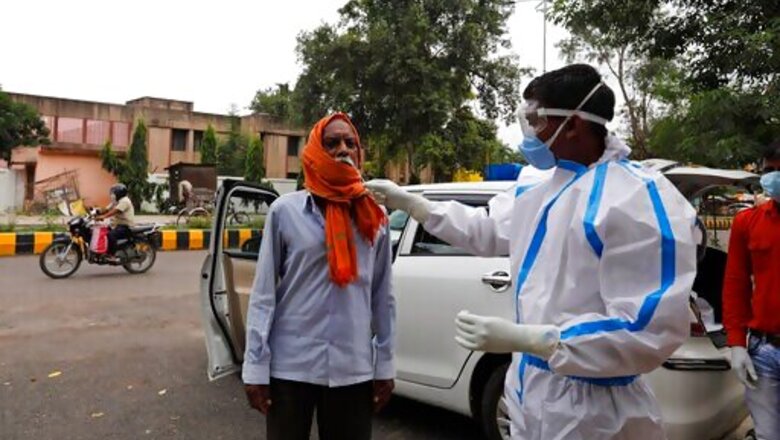
views
SEOUL, South Korea: South Korea is tightening social distancing restrictions in the greater capital area, requiring restaurants to provide only deliveries and takeouts after 9 p.m. and shutting down gyms and after-school academies.
Health Minister Park Neung-hoo announced the steps Friday after 371 new infections of COVID-19 the 15th straight day of triple-digit jumps that brought national totals to 19,077 cases, including 316 deaths.
The measures, imposed for eight days starting Sunday, will require restaurants and bakeries to provide only delivery and takeout meals from 9 p.m. to 5 a.m. and enforce mask wearing, distance between tables as well as keep customer lists when they do accommodate diners.
Franchised coffee shops, such as Starbucks, can provide only takeout drinks and food. Indoor sports facilities such as fitness gyms and billiard halls will be shut while after-school academies will only be allowed to provide remote learning. Visitors will be banned from nursing homes.
Park said more than 470,000 businesses in the Seoul area will be affected by the measures, which he described as the last stand before lockdown steps.
I once again plead to the people of our country — for yourself and for us, please remain in the safe space that is your home, Park said in a nationally televised news conference. Avoid contacting other people.
Most of the new cases came from the Seoul area, bumping the regions caseload to 7,200 and overtaking the southeastern city of Daegu, the epicenter of a massive outbreak in late February and March that was stabilized by April.
Health workers have found it more difficult to contain the recent transmissions centered around the more populated capital area, where clusters have been tied to churches, restaurants and schools. The country has added more than 4,300 to its caseload over the past 15 days, prompting concerns about overwhelming hospitals.
Korea Centers for Disease Control Director Jeong Eun-kyeong said predictions based on models suggest the country could possibly see daily jumps of around 800 or even 2,000 as early as next week if it fails to slow the viral spread.
While government has recently banned large gatherings and shut down nightspots and churches nationwide, there have been calls for elevating social distancing measures to the highest level. Such measures, designed to allow for only essential social and economic activities, would possibly prohibit gatherings of more than 10 and advise private companies to have employees work from home.
But Park and other officials said the government wasnt ready to implement Level 3 restrictions yet, saying they would inflict serious harm on the economy that policymakers say will likely shrink for the first time in 22 years.
Level 3 restrictions will affect a much broader range of businesses and facilities than the measures we just announced and leave deep scars on the economy, livelihoods and daily life, Park said.
In other developments in the Asia-Pacific region:
Australias hard-hit Victoria state on Friday reported 113 new COVID-19 cases for a second consecutive day, with authorities warning that the infection rate will have to fall substantially if a six-week lockdown is to be relaxed on schedule on Sept. 13. The latest daily tallies are the lowest in more than eight weeks, with a peak of 725 in early August. The latest death toll dropped to 12 from 23 on Thursday. Authorities want daily infections to fall at least to low double-digits before they would consider relaxing restrictions. Chief Health Officer Brett Sutton said: Were clearly still trending in the right direction. … Its not gotten below 100 yet, I do expect that to happen, if not over the weekend, then by next week, if trends continue.”
India has recorded another high of 77,266 new coronavirus cases in the past 24 hours, raising the countrys total to over 3.38 million. Nearly 47% were detected this month alone. The Health Ministry on Friday also reported 1,057 deaths for a total of 61,529. India has the third-highest caseload after the United States and Brazil, and its fatalities are the fourth-highest. Four of Indias 28 states western Maharashtra and the three southern states of Tamil Nadu, Andhra Pradesh and Karnataka are the worst-hit regions, accounting for 63.8% of fatalities and 54% of active cases. New hot spots include rural areas of Uttar Pradesh and Bihar states in the north.
China began moving into its final weekend before a full reopening of schools amid continuing measures to prevent any further spread of the coronavirus. The country reported just nine new cases on Friday, all brought from outside. Hospitals are treating 288 people for COVID-19 and another 361 are being monitored n isolation. China has recorded 85,013 cases since the virus was first detected in the central city of Wuhan late last year, with 4,634 deaths. The roughly 25% of students still out of school are due to return to classes on Monday. Lessons are being held on a staggered schedule and masks and social distancing are required. College undergraduates are also due to return to campus next week, with Beijing ordering tests for all 600,000 at the citys institutions.
___
Follow APs pandemic coverage at http://apnews.com/VirusOutbreak and https://apnews.com/UnderstandingtheOutbreak
Disclaimer: This post has been auto-published from an agency feed without any modifications to the text and has not been reviewed by an editor



















Comments
0 comment